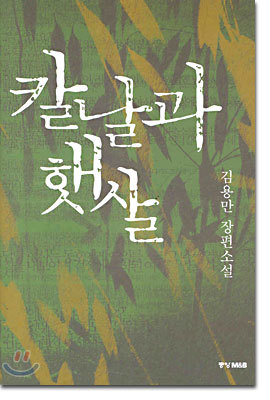1940年、韓国忠淸南道扶餘生まれ。釜山中学校、龍山高等学校を経て光州大学文芸創作科を卒業し、慶熙大学大学院国文学科博士課程を修了した。
一九八九年、現代文学に『銀の懐刀』を発表して文壇デビューした。短編小説集『君は僕の花嫁だ』、『妻が包丁を取った』があり、長編小説『やいばと陽射し』、『人間の時間』、『春川屋のノンスの母親』、『母の仮想の空間』、『狂った愛』(全四巻)、『残児』など多数の作品がある。その他、散文集として『川端康成の眠りと僕の戯言』、『随筆の新しい秩序模索』(全二巻)、詩論集『金容滿小説家の詩の読み方』、紀行エッセイ集『世界文学館紀行』などがある。短編小説『君は僕の花嫁だ』がKBSの一幕物としてドラマ化され、『春川屋のノンスの母親』が、KBSラジオで連続ドラマ化された。
長編小説『やいばと陽射し』が東仁文学賞審査作品に選定され、長編小説『残児』で2017年に韓国文学賞を受賞し、慶熙文学賞、国際ペン文学賞、晩牛文学賞、柳承圭文学賞、仏教文学賞、農民文学大賞、東アジア文学賞など、多数の文学賞を受賞した。
Kim Yong-man (born 1940) is a modern South Korean novelist.
Life
Kim Yong-man was born in Buyeo, South Chungcheong Province. He studied creative writing at Gwangju University and Korean literature at Kyung Hee University graduate school. He made his literary debut in 1989 publishing the novella "Eunjangdo" (은장도 Ornamental Silver Knife) in Hyundae Munhak. He is the author of three short story collections including Nuin nae gaksideo (늰 내 각시더 Youse Ma Woman) and five novels including Chuncheonok neungsueomma (춘천옥 능수엄마 Neungsu's Mom of Chunchonok ), inspired by his experience managing a successful restaurant in Seoul. He has also published several volumes of essays and literary criticism. He is the recipient of the Korean Literature Prize and the Kyung Hee Literature Prize, among others.
Writing
Born to a very poor family, Kim Yong-man barely completed high school and was unable to attend university for want of tuition. Instead he became a police officer, although later in life he completed undergraduate as well as graduate studies. While working as a policeman, he participated in suppressing democracy movement protests by university students. Kim was assigned to a regional police station where he also watched over prisoners in the small lockup there.
After resigning from the police, he tried his hand at several businesses, making quite a bit of money. Unable to find happiness through mere material success, however, his fundamental aspirations for beauty and solitude led to his desire to write. The poverty of his family, diverse job history, and life travails served as excellent sources of inspiration for his work.
Kim's 2003 novel, Kallalgwa haetsal (칼날과 햇살 Blade and Sunlight), is a revised version of the author’s literary debut "Eunjangdo." A story about a detective and an armed agent sent from North Korea, the novel depicts the ideological conflicts caused by the division of the Korean peninsula, as well as the possibility of reconciliation. Now the president of a medium-sized company, Kang Dong-ho used to be a detective in the intelligence department thirty years ago. He pays a visit to Bae Seung-tae, an armed North Korean agent he had investigated in the past. For the past thirty years, ever since they first met as agent and detective, the two have maintained a relationship of conflict and reconciliation. The two discuss the state of affairs between the two Koreas.
생애
김용만은 1940년 충청남도 부여에서 태어났다. 용산고등학교를 졸업한 후, 광주대학교에서 문예창작학을 전공하고, 경희대학교 대학원 국어국문과를 다녔다. 《현대문학》으로 등단했다. 작가는 다수의 소설을 발표했을 뿐 아니라, 산문이나 세계문학에 관한 연구서를 출간한 바 있다.
김용만은 경기대학교 국어국문학과 초빙교수, 디지털서울문화예술대학교 문예창작학과 외래교수, 《독서신문》 논설위원 등을 역임했고, 잔아박물관 관장, 잔아창작아카데미 원장, 시사랑문화인협의회 이사 등을 맡고 있다.
작품 세계
김용만은 역사적 상상력과 인간을 억압하는 관습에 반해 자유와 욕망을 추구하는 인물을 작품의 주제로 삼아 한계를 거부하는 사유를 소설로 형상화한다.
장편소설 《칼날과 햇살》ㄹ(2003)은 분단된 한국의 정치 상황을 소설의 배경에 적극적으로 사용하고 역사적 상상력을 동원하여 남과 북의 대립을 인간적인 관점에서 풀어낸다. 작품은 북파공작과 무장공비 침투가 발생했던 1960년대를 배경으로, 남파 무장 공작원과 형사 사이에 형성된 갈등과 우정을 묘사하며 남북의 이념 대립을 어떻게 극복해야하는지에 대한 대안을 제시하고 있다.
소설집 《아내가 칼을 들었다》(2006)는 상식과 관습을 전복하는 단편 속 인물들의 행위와 사건들을 통해 인간의 이면을 폭로하고 있다. 특히 소설집에 수록된 단편들은 모친 살해 등 죽음 모티프를 공통된 특징으로 지니고 있으며, 인간의 죽음에 대한 작가의 사유를 통해 현재에 대한 허무함을 확인할 수 있다.
장편소설《애나》(2020)는 1964년 6.3항쟁부터 1970년대 중반까지의 현대사와 풍속을 배경으로 주인공들의 불가능한 사랑과 그들을 둘러싼 역사의 문제를 성찰한 작품이다.
주요 작품
1) 소설집
《뉜 내 각시더》, 실천문학사, 2003.
《아내가 칼을 들었다》, 랜덤하우스코리아, 2006.
《그리고 말씀하시길》, 문학신문출판국, 2022.
2) 장편소설
《괴물을 사랑한 여자들》, 연인, 2008.
《춘천옥 능수엄마》, JANA문학사, 2009(개정판, 《능수엄마》, JANA문학사, 2012).
《잔아》, 미네르바, 2017.
《칼날과 햇살》, 랜덤하우스코리아, 2003(개정판, 도화, 2017).
《애나》, 문학사상사, 2020.
3) 산문집
《가와바타 야스나리의 잠과 내 허튼소리》, 랜덤하우스코리아, 2007.
《수필의 새로운 질서 모색》, 도화, 2016.
4) 연구서
《세계문학관 기행》, 서정시학, 2010.
수상 내역
2010 경희문학상
2017년 한국문학상



